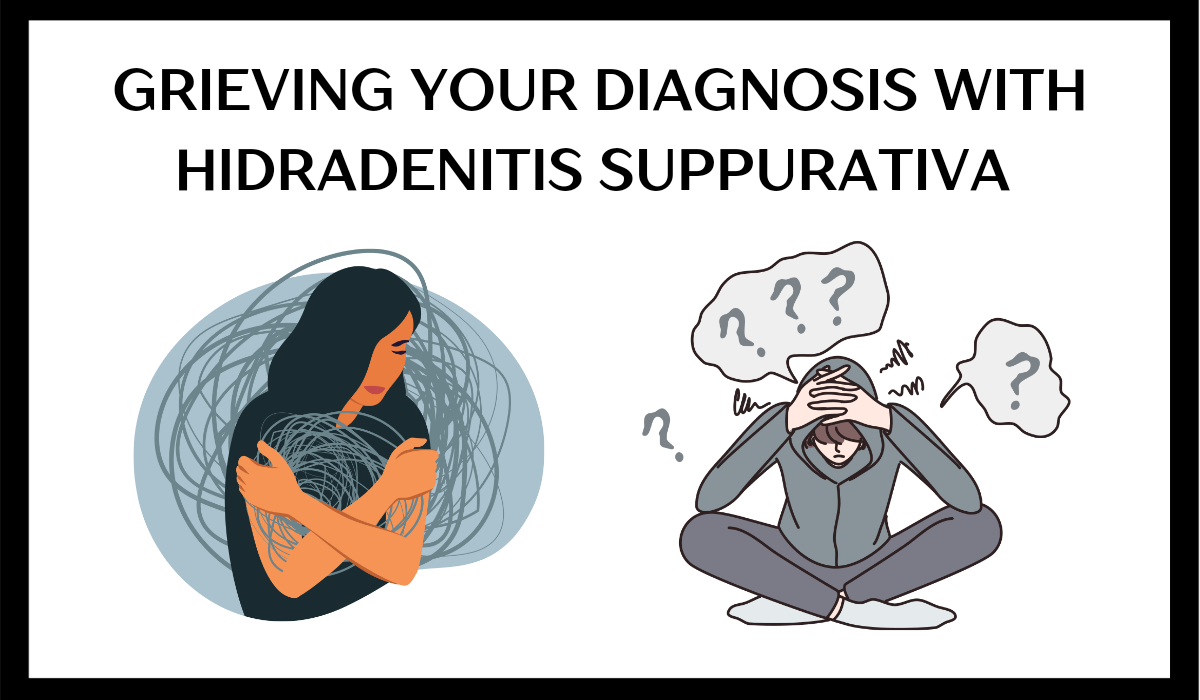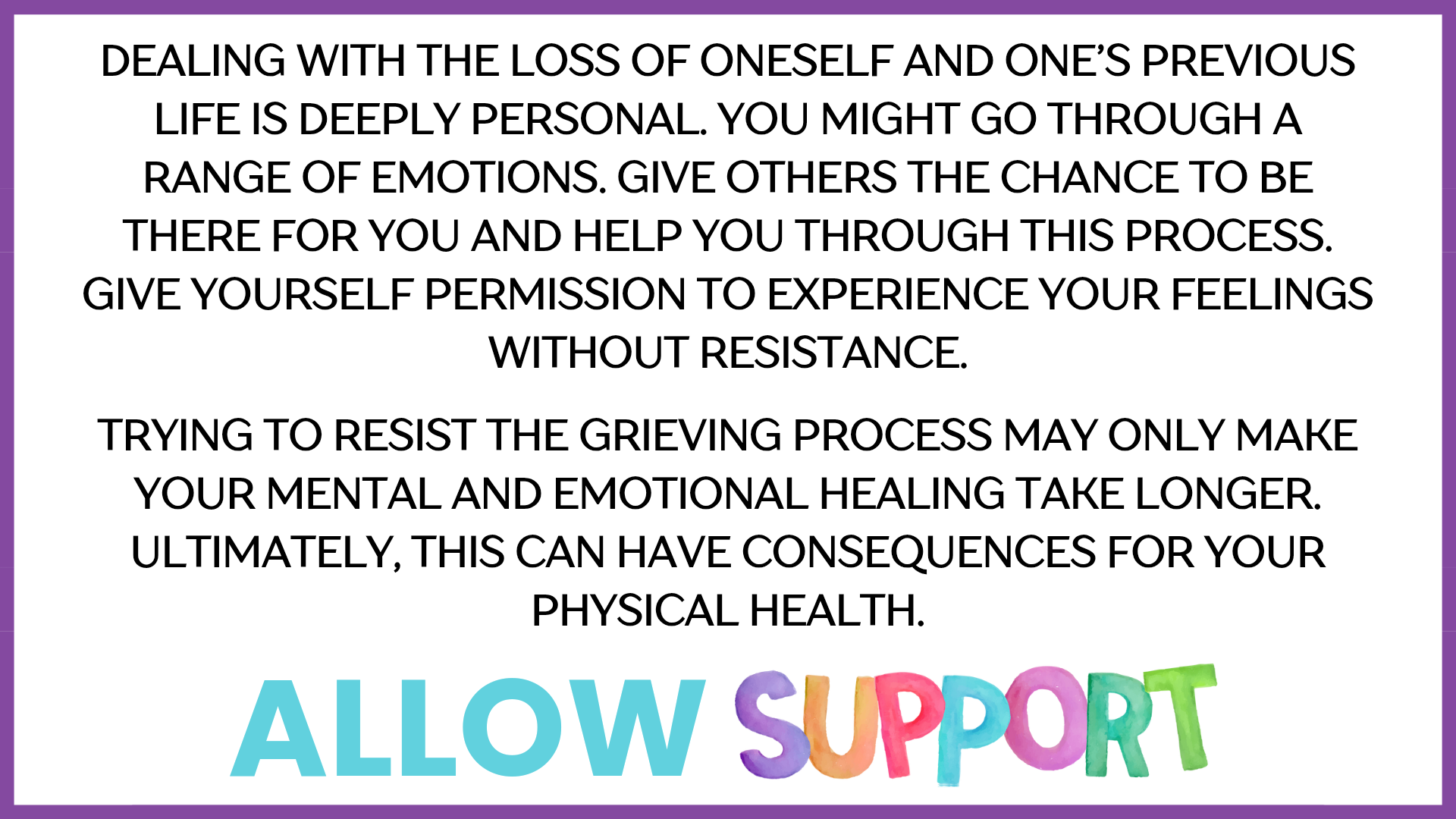Grieving Your Diagnosis With Hidradenitis Suppurativa (HS)

If you’re reading this, it’s likely you’ve been diagnosed with HS and may be feeling lost and hopeless. And potentially experiencing grief.
There are multiple ways grief can be experienced
- There has been a death
- The loss of any kind of relationship
- The death of a beloved pet
- No longer having a place to live
- The loss of a career or a passion
- Being diagnosed or living with chronic illnesses
- The ‘old you’ can be lost due to chronic illnesses like HS
Grief typically involves several stages, the most common are listed below.
The Denial Stage
Denial serves as a natural defense mechanism to protect you from facing reality. You may think things such as, “It’s impossible - this can’t be real”?! This is a typical response when faced with a new diagnosis, job loss, relationship ending, or loss of the old self.
This phase of the process is a common and temporary reaction to assist you along the way. However, avoid lingering in this phase for an extended period.
The Anger Stage
By now, the denial should have subsided, and these mixed emotions might manifest as anger. Anger can arise towards almost anything: your current circumstances, loved ones, acquaintances, or even yourself. Feeling angry may also result in feelings of guilt or remorse, intensifying the anger.
The Bargaining Stage
Self-bargaining is something that people commonly do. By now, the walls should be falling, but keep in mind that bargaining is still a defense mechanism to shield yourself from reality and the accompanying pain. This is the moment where you may experience feelings of helplessness, vulnerability, and a strong desire to regain control.
You may go down the “what if path." “What if I had made a different decision - what would have happened?” “What could have happened if I had sought help sooner?” “What if I would have listened to my significant other?” And so forth.
Guilt and bargaining often coincide as you may genuinely feel there was something you could have changed. It’s important to remember that you are not to blame for your illness.
The Depression Stage
Grieving involves various types of depression, and it is different for everyone. You might experience feelings of sadness, hopelessness, or regret. There is a possibility that you will be concerned about finances or burdening others. Maybe you’re concerned about not spending sufficient time with your loved ones.
Getting validation from your support system could be helpful in this phase. Alternatively, you can have some peaceful moments alone to process everything.
The Acceptance Stage
It's challenging for everyone to reach this stage of the grieving process, and it requires time. However, it can be done. It’s time to find some peace within yourself and the situation. While it’s not expected for you to be happy or jumping for joy, it’s important that you’ve progressed beyond the depression stage or are actively working on it.
At this stage, you may have acknowledged and embraced the new situation (to a certain extent) and are prepared to face the ‘new you’ and the ‘new normal’.
Don't try to go this alone
- Having a mental health therapist can be helpful in guiding you through your available options.
- Make sure to inform them about your chronic illness and the challenges you’re facing.
- Engage in an online support group.
- Seek out online trusted self-help resources can provide assistance.
- Make time for solitude and do something that brings you happiness.
- If you’re feeling suicidal, please contact the designated suicide hotlines for your specific country.

It’s important to understand that not everyone goes through these stages in the exact same order or even undergoes all of them. HS, grief, or depression will be different for each individual. Every individual will experience their own unique process. While there is no deadline, it is essential to fully engage and work through in the process.
Don't give up on yourself. You deserve clarity and serenity.
If your depression is disabling and interfering with your daily activities, or if you are having thoughts of suicide, it is crucial to reach out to a medical professional or hot line right away.
Research Study Snippets:
A systematic review and meta-analysis indicates that depression and anxiety are common comorbid conditions in patients with HS.
Depression and anxiety are very frequent conditions in the general population and also in HS, being encountered in almost 20–30% of patients.
Hidradenitis suppurativa has been shown to be significantly associated with a high suicidal risk.
Among the common consequences of unresolved grief in the chronically ill is a worsening of the illness.
Special Note: Researched, compiled, and written by Denise Fixsen. This information is backed by my 46 years of living with Hidradenitis Suppurativa, 10 years of dealing with multiple chronic illnesses, 36 years of advocacy, and continuous education. And to ensure accuracy, reliability, and trustworthiness, I incorporate peer-reviewed studies and other high-quality sources into my articles and material. I also wanted to inform you that I’ve chosen to end my collaboration with editors on my articles. Although there may be grammar errors due to brain illnesses (mostly), with this said, my content remains reliable, factual, and solid.
Medical Disclaimer: This content is solely for information, education, and support. The purpose is not to serve as a replacement for professional medical advice, diagnosis, or treatments.
Sources: PMC9865498, PMID: 25869290, doi:10.1001/jamadermatol.2019.0759, doi:10.1097/PSY.0000000000000717, DOI:10.1016/S0304-3959(97)00146-2, www.apa.org, National Institutes of Health - Laboratory for Stress Assessment and Research, Semel Institute for Neuroscience and Human Behavior at UCLA
Article posted on 09-24-2024
741741 Crisis Hot Line 741741 Crisis Hot Line
